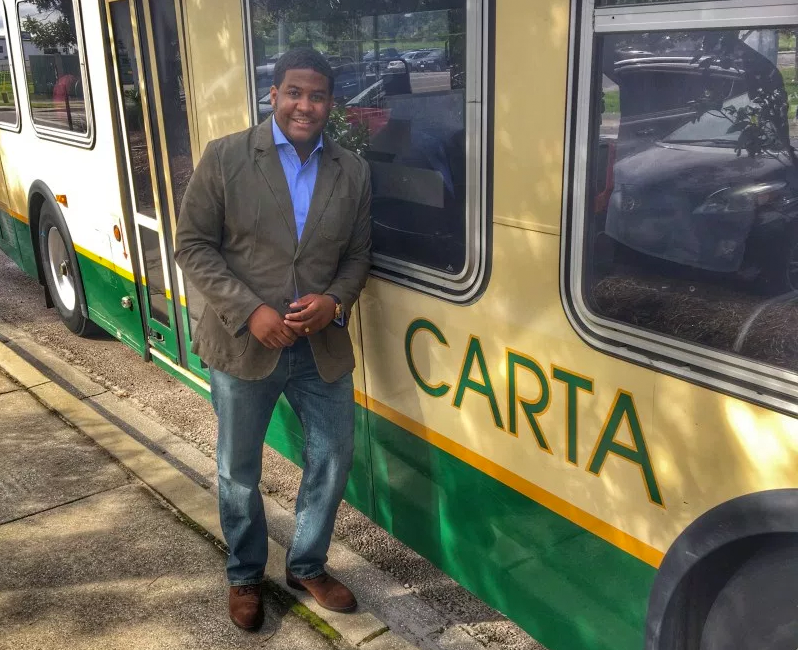There aren't many city transportation chiefs with a background like Keith Benjamin.
Benjamin, 30, worked at the National Partnership for Safe Routes to School and in the policy department of U.S. DOT before taking the helm at Charleston DOT in June.
Under former U.S. Transportation Secretary Anthony Foxx, he did pioneering work on transportation equity, focused on righting systemic racial and social injustices etched into the transportation system.
In a field that tends to be predominantly white, especially in executive positions, Benjamin is also one of the few black men to ascend to the top transportation job at a major mid-sized American city.
In city transportation, good leadership can be a game changer, opening up possibilities that didn't exist before. So Streetsblog contacted Benjamin to hear about what he's up to in Charleston. He told us about the challenge of coming to a new city, how he's approaching the task of guiding change, and why it's important to pay attention to Charleston's bus stops. This interview was lightly edited for length and clarity.
Anthony Foxx, he brought you on in part to work on some of the civil rights issues he focused on late in Obama's second term, for example addressing the way highways have historically divided neighborhoods of color. Is that still ongoing with the new administration?
I was hired in a career position at U.S. DOT in the policy shop in the office of the secretary to work on transit, bike/ped issues. Because of my background at Safe Routes, I already knew all the advocates all over the country.
My role was to try to help institutionalize the work Secretary Foxx was doing. He really brought the conversation about transportation equity to the forefront on the federal level.
[After Trump was elected] I wasn’t even really sure if the same level of conversation that was being had when Foxx was at the helm would really continue. There was significant push among staff to try to make sure that that [Federal Transportation] Equity committee came together and stayed intact. But I don't know what has happened. I left very early in the new administration.
At Charleston, how do you think your approach will vary from what we've traditionally seen in the past?
First, I don't believe in placing transportation in a box on its own. Instead of articulating transportation as an end in itself, we should ask what role does it play in community-building as a strategic tool. Transportation is the common denominator for all community-building.
A second thing I believe: People’s lived engagement and experiences — that is a data set. A lot of people (in the field) put engagement and people’s lived experiences at a lower rung. That’s just not the cloth I’m cut from.
We need diverse voices and diverse decision makers. Unfortunately that isn’t the case right now [and] the decisions that are made aren’t equitable.
Can you explain how that philosophy might translate into changes in Charleston?
One thing I want to work on is making our transit system more robust. The vast majority of bus stops are just a pole and a sign. What are we saying to those people that that’s their mode of transportation? Are we saying to those people that your mode of transportation is just as important as people who are in a private automobile?
Another thing is moving past car-centrism. Being down here in the south and in a coastal area, where that’s always been the case. I want to focus on being able to showcase what transit can be in a broad range and being sure that people can make those choices.
We are about to do our first parking study in 20 years. We have not taken account of where we park, how we price our parking. We have not taken into account how we use the revenue from our parking.
We have an amazing bike-share program. I am working with Holy Spokes (the local bike-share) to start a pilot program for low- to moderate-income people with reduced fares.
I wanted to discuss race a little bit. Your experience as a black man, how do you think that will affect how you approach this work?
I am in a Southern state. I am 30 years old and I am a black man in this position. I am probably the youngest or one of the youngest in the country, for a major mid-level city.
I believe that there is a moral code for transportation and community building. I believe that, especially on a local level, every day there are opportunities for you to make decisions that impact people in a positive or negative level.
For me, it's important to have a keen level of discernment. It’s important that I am listening to people, coming to a new city. I’m not from Charleston. For me to ascribe solutions without taking into consideration people’s lived experiences ... I bring a level of consciousness in that regard. It’s a level of consciousness with who I hire. It’s a level of consciousness with who’s my on-call engineers. It’s just something I’m constantly conscious about.
If we’re going to do transportation then we have to do transportation for everybody.





